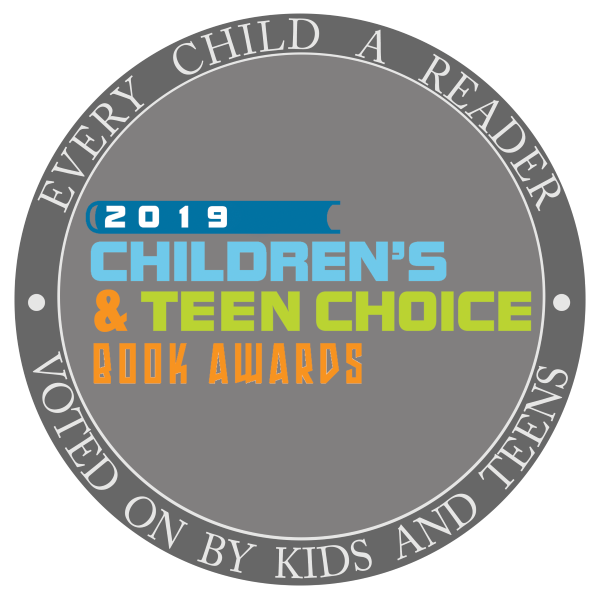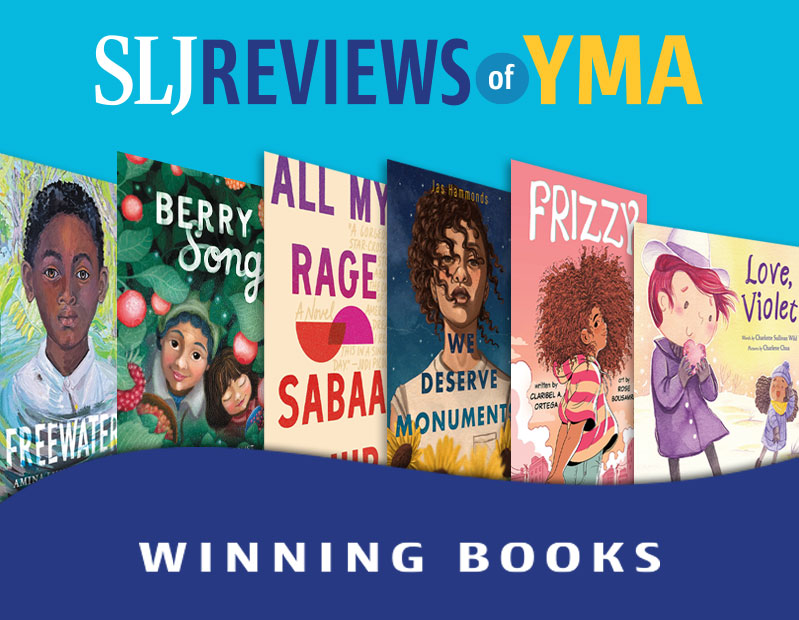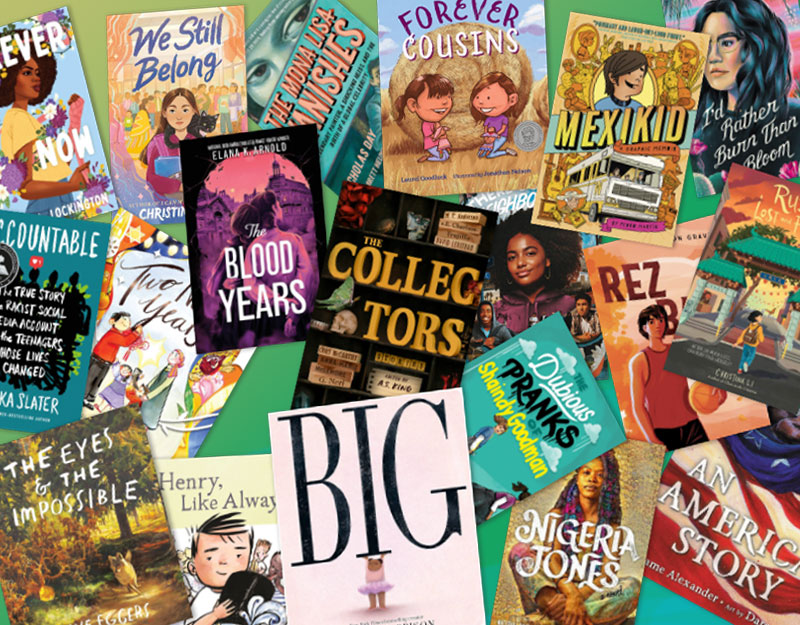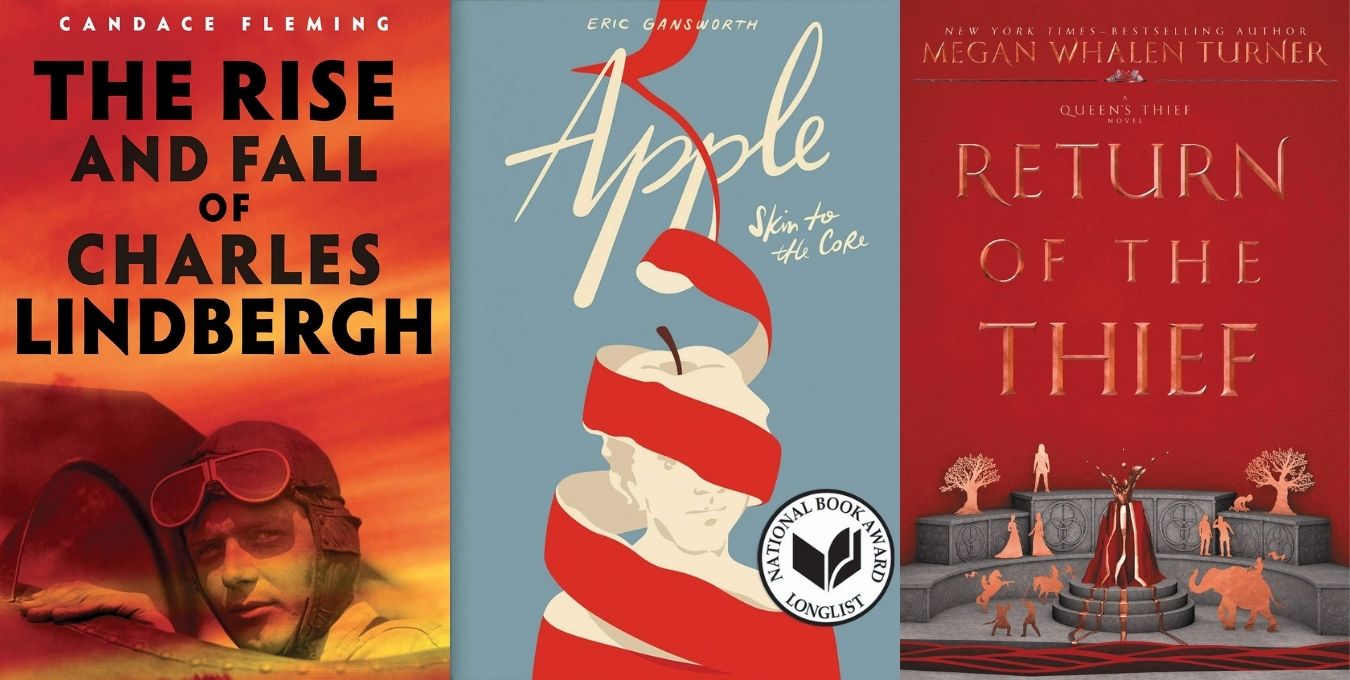The People We Were Before
Well, I told you I would surely be back and talking about grief, and here I am. Just the title of this book spoke to me, personally, as I’ve thought a lot recently about the time before vs the time after in terms of my own grieving process and all the changes that death has brought my way. The Sharon I was before, well, I miss her, sometimes.
“Kasey’s window has been dark for fifty-nine days” starts our novel, and immediately we know that our story will have some darkness as well.
Grief is certainly far from a new theme in children’s literature, and it, of course, shows up this year more than once. Middle grade books that handle loss in childhood tend to get talked about for their Newbery potential even if just because they are viewed as the kind of books that win Newberys. But, why is that? Do deep topics make us feeel so much emotion that we look past other flaws?
ADVERTISEMENT
ADVERTISEMENT
The Ethan I was Before definitely makes the audience feel and I found true excellence in its exploration of 12-year-old Ethan’s guilt, grief, and lonliness. His loss is palpatible. Ethan’s voice is real, honest, and, at times, heartbreaking. He barely questions the indifference and hostility he receives from others (his brother, his best friend’s parents, his grandfather) because he feels that this is what he deserves. While most children don’t face guilt over something as tragic as Ethan does, I would argue that most can relate to the feelings. Think back to childhood and that= feeling that you’d done something wrong and there was nothing you could do to make it not have happened…this is a harsh lesson of childhood, but a necessary one.
I just finished reading Jamieson’s All’s Faire in Middle School which tackled this same feeling with enough emotion to make my heart hurt. It’s a graphic novel that I think deserves more converation, but for now, I mention it only to say that this makes for an interesting comparison. Very different stories, told in very different formats, and where Ethan’s “crime” is much more significant than Impy’s in All’s Faire, both characters’ guilt is effectively expressed and both deal with what they feel is deserved abandonment because of their actions. Universal pains of middle grade readers.
Back to Ethan, though, a lot happens in this book, and I’m not sure the plot is as strong as the exploration of theme or as Ethan’s growth as a character. The secondary characters serve as mirrors for Ethan’s emotions, but their motivations aren’t always clear. His brother’s anger is never really satisfyingly explained, for example, and dissipates too suddenly at the book’s conclusion. Ethan’s grandpa Ike’s inconsistent behavior is also not explained satisfactorily, although we are too understand that it, too, is grief induced. Coralee’s character sometimes feels like merely a plot device to get Ethan out of his head, and maybe that’s OK, but even though the reader learns about her motivations at the end of the book, I don’t know that this was enough.
Plus the mystery of the jewels! It’s not the only jewel-themed mystery we have to talk about this year. Beyond the Bright Sea and The Pearl Thief both involve mysterious jewels, and I think Ethan is the weakest of the three on that front. And while the jewels create an external mystery, there are other mysteries that are more powerful in this book – plot points and stories that are unveiled slowly and delicately. What happened to Kasey? Why is Ethan’s brother so angry? Who *is* Corallee and are her stories real? The jewels start to feel like an obvious plot device needed by the author to get us to the conclusion. Throw in a hurricane and it feels a bit like we’re in an entirely different book here for a minute, with so many sudden answers and tidy conclusions to complicated questions.
Does this book, though, need to be the best mystery of the year to be a contendor for the award? Or is the gentle exploration of Ethan’s emotions and relationships enough to carry it to the top?
The reader wonders, through the whole book, if Ethan will figure everything out and go back to being the Ethan he was before. Ethan can’t change what happened. None of us can. But by the end of the story the audience, along with Ethan, realizes that while moving backwards in time isn’t possible, the good news is that moving forward is. Ethan may never be the person he was before the tragedy, but he is still Ethan. I am still Sharon. And life moves inevitably forward. Young readers may not all face the kind of trauma that Ethan has, but surely many can relate to him and his internal dialogue.
Filed under: Book Discussion
About Sharon McKellar
Sharon McKellar is the Supervising Librarian for Teen Services at the Oakland Public Library in California. She has served on the Rainbow List Committee, the Notable Children’s Recordings Committee, The Arbuthnot Honor Lecture Committee, and the 2015 Caldecott Committee. You can reach her at sharon@mckellar.org.
ADVERTISEMENT
ADVERTISEMENT
SLJ Blog Network
Name That LEGO Book Cover! (#53)
Cover Reveal and Q&A: The One and Only Googoosh with Azadeh Westergaard
K is in Trouble | Review
Fighting Public School Book Bans with the Civil Rights Act
Take Five: Middle Grade Anthologies and Short Story Collections
ADVERTISEMENT









I thought this had similar themes to Lost in the Sun and The Thing About Jellyfish but I thought both of those books were stronger overall. (Although I thought Ethan’s parents were better characters than the parents in those books.) I would recommend Ethan to fans of those books but it does not feel like an award winner to me. I agree that the jewels were the weakest part (I had actually forgotten about that plot.)
I’m trying to figure out how I feel about the jewels. It seems that it is being used as a through-line rather than a one-shot plot device, though. Since it ties the kids back to the past and also allows for that fox rescue scene to highlight Carolee toward the end. I have other observations about this title and the jewels weren’t my chief complaint. It bears comparing with other years’ titles when recommending books to students. However, we, as mock Newbery members (and real committee members) are encouraged to compare only with books eligible in the same publication year. Is this one more successful than other titles dealing with grief and loss/death? That definitely would be a good aspect to consider.
Oddly enough, I thought a comparable book from this year to THE ETHAN I WAS BEFORE was ME AND MARVIN GARDENS — something about the wolf subplot. I think this may indicate THE ETHAN I WAS BEFORE might take on too many things to be truly effective. I wrote on Goodreads that any one of 1) Ethan’s guilty feelings 2) Kacey’s outcome 3) Coralee’s history 4) the wolves 5) Ethan’s mom and Ike 6) Ethan and his brother could have been an entire book in itself.
Roxanne, I am happy to see you use the word “encouraged.” Usually, people are much stricter about mentioning older books, and I’ve always had trouble seeing how the only possible reading of the Newbery Terms and the Newbery Manual was that such mentions are forbidden.
The Terms and Criteria state, “The committee in its deliberations is to consider only the books eligible for the award, as specified in the terms,” and “The term, ‘only the books eligible for the award,’ specifies that the committee is not to consider the entire body of the work by an author or whether the author has previously won the award. The committee’s decision is to be made following deliberation about the books of the specified calendar year.” The Newbery Manual states, “Committee members are reminded that they are comparing books of the year with each other and are not to consider earlier works of any author.”
But couldn’t I plausibly interpret the word “consider” as meaning, “consider for the Award?” Surely nobody thinks a comparison to an older book means the older book is being “considered” in that sense?
I am aware that the Newbery Manual states, as a “tip to keep in mind” for committee members, “Make comparisons only to books that were published in the year under consideration.” That’s a pretty clear statement. But still, it’s a “tip.” Sure there are good reasons. I think maybe Jonathan Hunt once explained here that it’s a matter of time and practicality. You have a lot of books to get through, so you have to stay focused on the books being considered for the award and not waste time bringing non-eligible books into the conversation. Fair enough, but couldn’t there be a scenario when invoking an appropriate older book might help the Committee make the best decision more quickly?
Jonathan also once suggested the rule was there because the Committee needed to work from a shared body of reading–that not everybody has read Charlotte’s Web so it’s not fair to invoke it in a discussion. I’m not sure I agree. I would think one of the main reasons to have a 15-member committee is to bring a diversity of experiences to bear. I think it should be fair for a committee member to say, “I’ve read lots of books like this, and this one is or isn’t all that,” even if other committee members haven’t “read lots of books like this.” It would seem against the spirit to ask committee members to put blinders on their own unique experiences and perspectives.
In conclusion, it seemed to me the standard interpretation was, you can’t talk about older books, period. But careful readers that we are, is that really an inescapable conclusion from what’s in the Terms and the Manual? That’s why I was encouraged to see you use the gentler, “[we] are encouraged to compare only with books eligible in the same publication year.”
In response to Leonard and this, in particular:
“Oddly enough, I thought a comparable book from this year to THE ETHAN I WAS BEFORE was ME AND MARVIN GARDENS — something about the wolf subplot. I think this may indicate THE ETHAN I WAS BEFORE might take on too many things to be truly effective. I wrote on Goodreads that any one of 1) Ethan’s guilty feelings 2) Kacey’s outcome 3) Coralee’s history 4) the wolves 5) Ethan’s mom and Ike 6) Ethan and his brother could have been an entire book in itself.”
I agree that this book is maybe taking on too much. It’s funny that the wolf plot stood out for you, and man, it barely registered for me. But you are right that each of those could almost be a full book themselves.
I’m going to talk about “Amina’s Voice” at some point soon, and I had the same problem with it. A much slighter book, and I feel similarly weakened by trying to do too much.
Thanks, Roxanne. I was just about to say the same thing regarding previous year titles, pretty much precisely.
Where else have we seen grief and loss/death this year? Clayton Byrd Goes Underground comes to mind, and it deals with grief very differently than this book. An interesting comparison could be made there, for sure. The Hate U Give in some ways is an even more direct corelation because it deals with death of a close peer in the presence of the protagonist and tackles issues around survivor’s guilt. The audience for these books is quite different, but the themes have similarities. We’ll talk more about the Hate U Give later and whether or not it is “too YA” for the Newbery.
Refugee by Alan Gratz has moments of great losses and grieving. I’d also argue that Jinny in Orphan Island confronts her grieving over the loss of a dear friend for the entirety of that narrative, too. How about Pearl Thief? Julia’s grief goes beyond over her grandfather’s passing — but for her childhood, for the estate, and for the connection between people. Each author decided to do something quite different with their main characters and their reactions in the face of losses.
And I just read Nina LaCour’s newest book (We are Okay), which I don’t think is a Newbery contender, but which did do a lovely job with grief.
I thought the first half of ETHAN was really strong and the second half was not as carefully constructed. Did anyone else think the ending felt a bit melodramatic?
Relating this back to Leonard’s comment about bringing older books into the Newbery conversation: If I had never read BRIDGE TO TERABITHIA or LOST IN THE SUN, would I feel differently about ETHAN? Probably. We automatically think of comparable books when we read a new book, right? (At least librarians do…) While I think it’s probably best to avoid name dropping old books in a formal Newbery discussion, there is something about being “distinguished” which is related to being original and individually distinct. And obviously we rely on our knowledge of literature in general to be able to discern if a book has elements that are hackneyed or cliche or trite.
So if I were on the committee, I’d want to call attention to the specific elements in the book that trigger that feeling of “I’ve read books that have done this better…” I don’t need to necessarily name drop the book where it was better. I just want to identify the parts of the book on the table that seem to fall short and try to articulate why and how. Does that make sense?
I might be wrong, but I read Roxanne’s use of “encouraged” as applying to a blog like this, where we try to simulate Newbery procedures to some degree, but allow a broader approach for a variety of reasons. That “tip to keep in mind” that Leonard notes seems pretty clear to me. I see it as practical advice for members to adhere to the very direct statement “that they are comparing books of the year with each other.” It’s very hard to do, because as Desiree notes, “we automatically think of comparable books.”
I don’t think the Terms and Criteria or the Manual is meant to “to put blinders on their own unique experiences and perspectives.” I feel that phrases like “I’m no mystery reader, but…” or “I love biographies and this one…” are fine because they speak about you as a reader, rather than specific ineligible books. Those phrases can frame your approach to a book, but won’t sway anyone around the table to your viewpoint. You would still have to “identify the parts of the book on the table…and try to articulate why and how,” as Destinee puts it. You may have comparable ineligible books in mind as you do this which may help you identify what distinguished elements look like….but would it help your argument to be able to name that book? Leonard, can you share an example of “a scenario when invoking an appropriate older book might help the Committee make the best decision more quickly?” Assuming that at least some members might not have read the older book, or read it recently, or even heard of it?
Leonard and others, I would say that it is best to not make qualitative comparison of any current year’s books against previously published titles: whether it’s the author’s own book — statements like, “This is not his best book,” is definitely not appropriate; or it’s a book in the same genre or tackling similar topics, exactly because that you are working with a group of people whose only truly shared experience is the collection right in front of you. It is difficult and I don’t think quite fair to say something like, “Trust me, I know that this book is so much better than this other book that I read and 3 other people read even if most of you have not read.” In the long run, these statements do not really help your committee members form real opinions and is not the best use of very limited discussion time.
Destinee, Steven, and Roxanne, thanks for the thoughtful comments. I really do basically agree. But here are some examples, some from past years’ Heavy Medal discussions, where I think some flexibility could add to the discussion:
Samurai Rising – I was actively involved in this discussion. At one point I directly compared Turner’s depiction of a couple of events to a translation of Tales of the Heike. I feel this was a valid and potentially valuable comparison to make in order for the discussants to properly evaluate the book. Maybe showing how closely Turner was following a source model is more of a plain factual illustration as opposed to a comparison between books, but someone else did comment that the comparison influenced her aesthetic judgment of Turner’s writing as well.
Raymie Nightingale – I quoted Flora and Ulysses to show how Kate Dicamillo used the exact same idiosyncratic sentence structure in both books. I think this might be appropriate if someone else had expressed the opinion that Dicamillo’s way of expressing herself in Raymie Nightingale supports Newbery consideration because it seems fresh and unlike any other eligible book. Mentioning Flora and Ulysses’ use of the same specific construction would be a quick and I hope valid way to make the point that the device was not particularly organic to the book and, as an established facet of Dicamillo’s style, not real evidence for originality or distinction for the specific book in question.
Brown Girl Dreaming – this is a little different gray area, but one I am curious about. The Manual seems to say that even eligible books cannot be discussed if they were not nominated. I wasn’t the biggest fan of Brown Girl Dreaming. I liked the very comparable How I Discovered Poetry by Marilyn Nelson, but it wasn’t one of my top seven, so if I were on the committee, I probably would not have nominated it. If How I Discovered Poetry were not nominated, when Brown Girl Dreaming is discussed, would it be allowable to compare it to How I Discovered Poetry, a very comparable book from the same year? I posed this question to Jonathan Hunt, and he actually thought it might be permissible, but wasn’t definitive. A similar question came to my mind when Last Stop on Market Street won. Given that a relatively small number of picture books are probably nominated, does that unfairly advantage the few that are? No question Last Stop on Market Street is fine writing, but if I’m going to give the Medal to a picture book, I would prefer to be able to compare it to other, probably un-nominated excellent picture book texts from that year to make sure it stands out, and that it isn’t just winning some apples-to-oranges competition. But it’s not clear to me that’s permissible because of the nomination rule.
Series books – a constant thorn in these discussions, and I’m sure it will come up this year (THICK AS THIEVES). I agree one shouldn’t make qualitative comparisons between a book and its predecessors, but people often go further and essentially say we have to pretend we know nothing about them. I think this is impossible, and honestly I don’t believe anyone who loves a series, supports a book for the Newbery, and claims it “stands alone.” I would prefer to take advantage of the large committee and try to get the full sense of what the book is and how it works for readers both with and without prior knowledge (as there will be out in the real world – we don’t want to exclude well-read series readers from our ideal Newbery readership.) I think certain brief statements regarding previous books can be useful and help the discussion. For example, regarding Alexander’s Medal-winning The High King, I think it is critical to know the simple fact that all those many briefly appearing characters are returning from previous books, because not having that knowledge may well unduly influence one’s aesthetic judgments about Alexander’s achievement (e.g., the one-star rating and comments here from a Newbery reader http://lauramitolife.blogspot.com/2009/12/high-king.html). Or to take an example from this year, I haven’t read any of the Queen’s Thief books except the first. It does in fact help for me to be told that the Attolian, Nahuseresh, et al. return from previous books and that the King and Queen are in fact the main players in previous books. It helps me better understand the effectiveness of various authorial decisions Turner makes, even without having read those books, that I’d be able to less properly assess otherwise.
Leonard, how meticulous you are in giving specific examples and arguing your points. Truth be told, I agree with you on pretty much all of your cited titles/reasons for comparison, and I could totally imagine a committee, behind closed door, collegially working to take all of those points seriously. Patina of this year comes to mind — it is a sort of sequel; it has similar narrative styles/tones, etc. to Ghost. Let’s really delve into it when we talk about Patina, ok? I would argue that tips for discussion are just that — best, recommended practices to ensure timely, focused discussion.
Another book where grief factors in strongly is Eucabeth A. Odhiambo’s Auma’s Long Run.
Thanks for the suggestion, Monica. It’s on our “to read” list for sure!
I’m working on this one right now, and hope to post about it soon!
Thanks for the thoughtful examples, Leonard. With your “Brown Girl Dreaming” and “Last Stop on Market Street” scenarios, I believe the Manual does allow for discussion of eligible, but not nominated books from the same year. As I read it, the word “considered” is (regrettably) used in two different contexts. First it’s: “Only books previously nominated … by committee members be considered,” (p 34) which refers to titles that can be voted upon (or be “consideration for the award”) during the Midwinter Selection Meeting. So you can’t vote for anything that wasn’t nominated. Later, under the Tips, it’s “Make comparisons only to books that were published in the year under consideration” (p 36), which doesn’t refer to what can be voted on, but the whole range of titles that are eligible for the year. So you can talk about any eligible book during the Midwinter Selection Meeting, even those un-nominated ones that can’t, by this point, receive votes for the Award. Well, now that I’ve written it doesn’t look as clear as it is in my head, but that’s the way I’ve always understood things anyway….
Wow. I have learned so much here. I just moments ago posted on HELLO UNIVERSE making a comparison to a title from last year, so OOPS!
Such an interesting discussion! Thanks for all your points.
Two other books that explore grief, published this year, are TRAIN I RIDE by Paul Mosier and LEMONS by Melissa Savage.
TRAIN I RIDE didn’t blow me away initially, but it for some reason keeps rising up. Maybe because I’ve been less impressed with other titles. Hopefully this one will be discussed on here later.